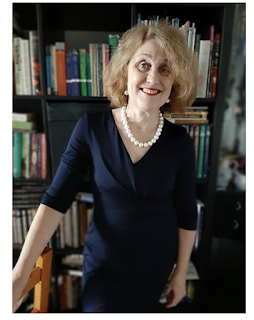We welcome back Melissa Knox to the Muffin with her essay "Racing Heart," which placed as a runner up in our Q4 2021 Creative Nonfiction Essay contest. If you haven't read it yet, you can check it out here.
Here's a bit about Melissa:
Melissa Knox’s recent writing appears in Another Chicago Magazine, Burningwood Literary Journal, and Lamplit Underground, which nominated her for a Pushcart. Her book, Divorcing Mom: a Memoir of Psychoanalysis, was published in 2019 (Cynren Press) and garnered praise from Helen Fremont, Ruth Wariner, and Charles Monroe-Kane. Visit her website at melissaknox.com.
WOW: Congratulations, Melissa, on your essay "Racing Heart" placing as a runner up in our latest creative nonfiction contest. This essay is full of memories from your younger years, music, and thoughts on racism. What themes would you say you are exploring in this piece?
Melissa:
I’m exploring what racism is—and is not. Music of my youth is often wrongly characterized as racist. Songs in the musical Hair about “white boys” and “black boys,” for instance, are about enjoying love and sex. Mick Jagger’s “Brown Sugar,” is a lighthearted riff, salted with crude jokes about slavery and colonization. It’s racy, but not racist: the music determines the intention, and the popular notion that his lyrics promote brutality, rape, slavery or torture is ludicrous. One of the greatest anti-racism novels ever written, Mark Twain’s Adventures of Huckleberry Finn, has been reduced to the two-hundred plus appearances of the n-word, whose so-called “impact” is mistakenly considered more important than Twain’s intention in using it.
WOW: Emphasizing "what racism is--and is not" is the perfect tagline for your piece and one of the reasons why it is so brilliant. What drove you to write this essay?
Melissa: I felt dismayed by a number of so-called anti-racist bestsellers advocating a new form of racism—Ibram X. Kendi and Robin di Angelo, for example, insist that all inequality stems from racism, that all white people are racist, that “whiteness” and “blackness” are essential qualities. This completely departs from some of the lyrics that blessed my teenage years, whose message is that our common humanity helps us to unite in favor of social justice: Sly and the Family Stone sang: “We got to live together.” Today, I see so many people—especially women—assuming guilt as “white people” or feeling victimized as people of color. I long for a return to the ideals of Dr. Martin Luther King, Jr.: know people as individuals, not members of a race. Judge people by the content of their character, not the color of their skin.
WOW: So well said. I recently visited the National Civil Rights Museum in Memphis, TN, which is the location where Dr. King was shot and killed. That museum speaks his message. If you haven't been there, I highly recommend it. Let's switch gears a little. Your bio is quite impressive! You have been nominated for several Pushcart Prizes. Tell us about your piece for that and how that felt!
Melissa:
It felt wonderful to be nominated by Concho River Review for “A Whale of a Gift”—an essay on love and betrayal featured also in my memoir, and by Lamplit Underground for brief essays on grief--but of course over a thousand people are nominated every year. How delightful it would be to actually win a Pushcart! I’ll work hard and hope to achieve that honor someday.
WOW: You mentioned you also have a memoir published, Divorcing Mom: A Memoir of Psychoanalysis. What are the universal themes you explore in your memoir?
Melissa: Brainwashing and obedience to authority. Stockholm syndrome. What it’s like to feel forced away from things you know in your heart are true, before cutting loose and realizing, with amazement, you don’t have to believe in an older and supposedly wiser person who—to your shock—isn’t helping you, as he says, at all.
WOW: I read about your book on your website. I encourage all of our readers to do the same. Your story may be of interest to several of our audience. Best of luck with your memoir. Congrats, again, Melissa on your WOW! Creative Nonfiction Contest essay win.






0 comments:
Post a Comment